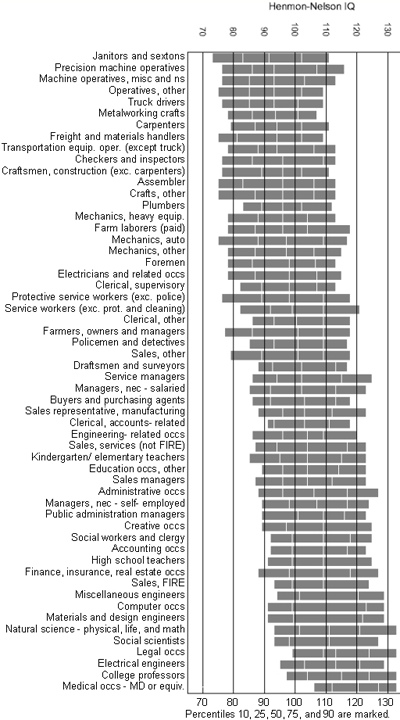BY JEFFREY BAUSCH
Engineer vs engineer: Who has the higher IQ?
A general comparison between the many variations of this intellectually demanding profession
To the outsider, hearing that you’re simply an engineer is sufficient enough: it means you are responsible for figuring out how to make something work; how to turn a concept into reality.

Engineers perform a wide range of tasks.
For anyone involved in the engineering industry, we know that this explanation couldn’t be further from the truth. There are many types of engineer out there, and what a chemical engineer can do cannot be done by a mechanical engineer, nor can the latter do what an electrical engineer can do.

Chemical, electrical, and mechanical engineers all perform very different duties from one another.
Since they’re all so incredibly different, the various types of occupation often don’t get compared to one another.
Until now (cue suspenseful music interlude ).
The following is a fun little breakdown of IQs per occupation, concluding with a comparison of the average IQ per profession as it relates to the fields of engineering, science, and mathematics.
IQ basics: category breakdown
Before we begin, we must first establish some of the basic boundaries. Namely, how an IQ score classifies the type of person. Depending upon the source you’re referencing, these categories can vary, so what we’ve done here is bunched together the most common types of classification for IQ scores.
They are as follows:
|
Average IQ score |
Category |
|
Over 140: |
Genius / near genius |
|
120 – 140: |
Very superior intelligence |
|
110 – 119: |
Superior intelligence |
|
90 – 109: |
Average / normal intelligence |
|
80 – 89: |
Dull |
|
70 – 79: |
Borderline deficiency in intelligence |
|
Under 70: |
Feeble-minded |
Drawing inspiration from a controversial study
A few years back, the University of Wisconsin-Madison’s Robert M. Hauser published a controversial study on occupation types. The reason why it created so much conversation is because he was the first to break down the average IQs of people involved in 50+ occupations.
On the lower end of his IQ spectrum were workers primarily involved in blue collar occupations, including janitor, assembler, and construction craftsman. On the upper portion of the IQ spectrum were white collar professions, including engineer, lawyer, and teacher.
These results aren’t exactly breaking news nowadays, but it created some buzz back then for the sheer fact that no one ever categorized intelligence based on occupation before. The study included this useful chart which summarizes his findings:

This graph is from Figure 12 of Hauser, Robert M. 2002. “Meritocracy, cognitive ability, and the sources of occupational success.” (Via: University of Wisconsin-Madison)
IQ and occupation
Upon review of the Hauser study, some additional research was done on our end, which resulted in the discovery of a somewhat comparable breakdown of the professions listed in the chart. They are as follows:
Average IQ Score: 140
Top civil servants, Professors, and Scientists
Average IQ Score: 130
Surgeons, Lawyers, and Architects / Engineers
Average IQ Score: 120
School teachers, Pharmacists, Accountants, Nurses, and Managers
Average IQ Score: 110
Foremen, Clerks, Salesmen, Policemen, and Electricians
Average IQ Score: 100
Machine operators, Welders, and Butchers
Average IQ Score: 90
Laborers, Gardeners, Miners, Sorters, and Factory packers
Source: lifeofanarchitect.com/iqs-and-jobs
Electrical Engineer vs Chemical Engineer vs Mechanical Engineer
Now, with the magazine’s audience primarily being electrical engineers and those associated with the field, even more research was conducted, which led to an even greater breakdown of IQ scores for professionals; specifically, those in the fields of engineering, science, and mathematics.
Putting them in list form, we can see how one occupation compares to the other.
So, without further ado, the results are as follows:
|
Average IQ |
Profession |
|
130 |
Physics |
|
129 |
Mathematics |
|
128.5 |
Computer Science |
|
128 |
Economics |
|
127.5 |
Chemical engineering |
|
127 |
Material Science |
|
126 |
Electrical Engineering |
|
125.5 |
Mechanical Engineering |
|
125 |
Philosophy |
|
124 |
Chemistry |
|
123 |
Earth Sciences |
|
122 |
Industrial Engineering |
|
122 |
Civil Engineering |
|
121.5 |
Biology |
|
120.1 |
English/Literature |
|
120 |
Religion/Theology |
|
119.8 |
Political Science |
|
119.7 |
History |
|
118 |
Art History |
|
117.7 |
Anthropology |
|
116.5 |
Architecture |
|
116 |
Business |
|
115 |
Sociology |
|
114 |
Psychology |
|
114 |
Medicine |
|
112 |
Communication |
|
109 |
Education |
|
106 |
Public Administration |
What does this tell us?
Nothing really. IQ tests are fast becoming yesterday’s standard, as the modern-day community has made the move to placing greater emphasis on skills, abilities, and professional training, rather than categorize an individual’s professional value based on how he / she scores on a test.
With this being the case, IQ results are more so now used in instances like this – a fun comparison, but nothing that should be taken too seriously. ■
Related Articles
Advertisement
Learn more about Electronic Products Magazine






